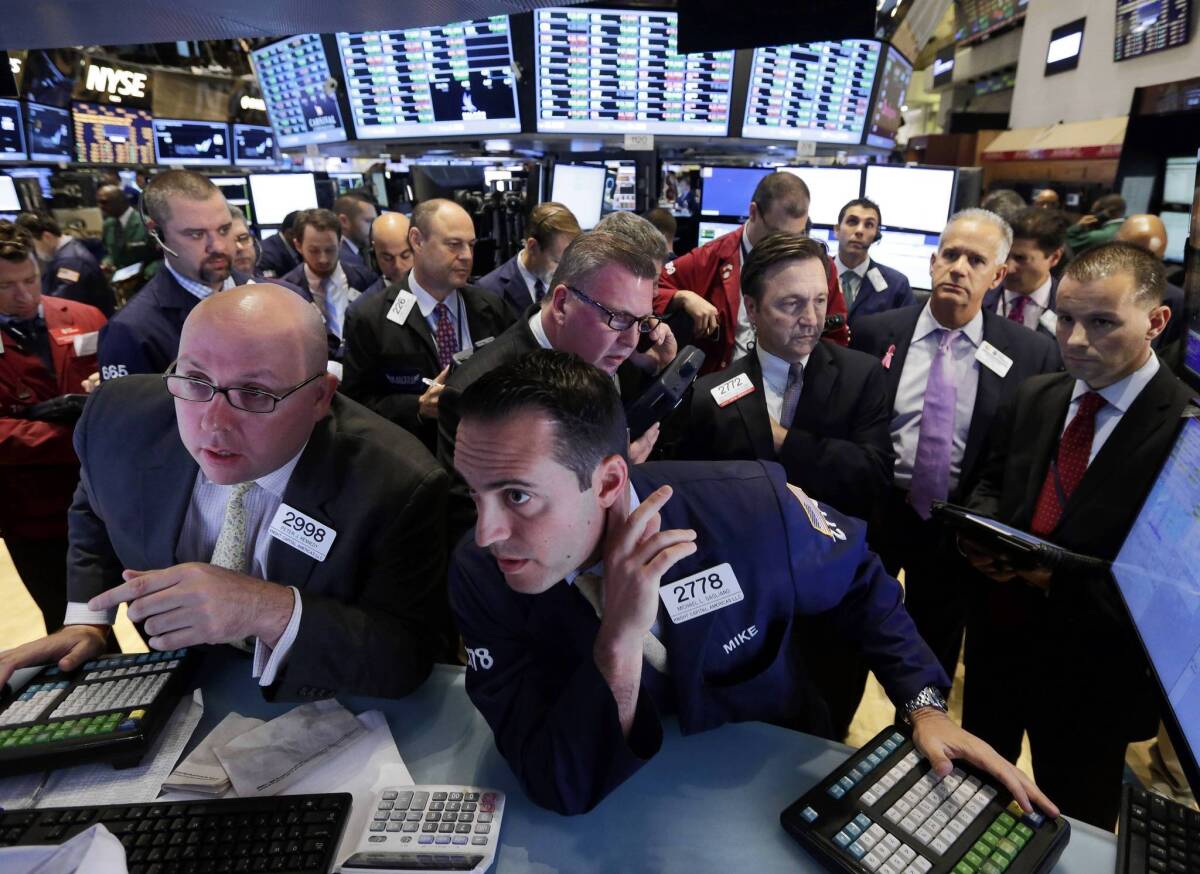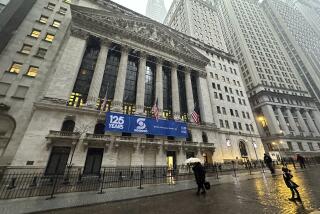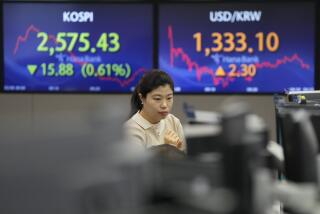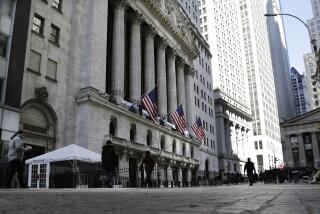GOP debt limit offer gives Wall Street its biggest gains of the year

The stock market staged its best rally of the year as lawmakers inched toward a deal that would temporarily stave off a government debt default.
The Dow Jones industrial average surged 323.09 points after congressional Republicans proposed increasing the U.S. debt limit through Nov. 22. That would remove the immediate threat of a default that had loomed over the global economy.
After the market closed, President Obama reportedly rejected the Republican plan because it would not end the partial shutdown of the federal government that began last week.
Nevertheless, the overture from House Republicans cheered Wall Street. Investors saw it as the first step toward a resolution of the infighting that has hung over the securities markets.
The Dow notched its biggest point jump of the year and its second-best percentage gain. Other major indexes had similar advances.
The bond market had a more muted reaction, although the yield on 1-month Treasury bills declined for a second day in a row.
The deal taking shape on Capitol Hill would simply delay a longer-term resolution to Washington’s fiscal impasse. For the moment, that’s enough for Wall Street.
“There was really a big sigh of relief,” said Jerry Braakman, chief investment officer for First American Trust in Santa Ana. “The market has been driven by fear.”
Stock and bond investors have remained relatively calm during the government shutdown.
Wall Street has clung to the notion that the government would not default on its debt, believing that lawmakers realize the damage a default could inflict on the global economy.
But investors had grown jittery in recent days as the stalemate seemed to intensify in advance of an Oct. 17 deadline for raising the debt limit.
Major investors, including Fidelity Investments and JPMorgan Chase, have shunned short-term debt that could be affected by a default.
The progress in Washington came two days after trouble emerged in an obscure but important corner of the bond market. In a regular auction of short-term debt, the government was forced to pay dramatically higher yields to lure investors.
The 1-month Treasury bills being sold are normally among the safest in the world. Investors aren’t worried about them being repaid. But they are concerned that a default would cause a delay in repayment.
The troubled auction demonstrated the risk of severe turbulence that could ripple through global securities markets in a default.
“That was a serious shot across the bow,” said Pat McCluskey, senior fixed-income strategist at Wells Fargo Advisors. “That certainly did not go unnoticed by the Congress.”
Yields on the 1-month Treasury bill surged as high as 0.33% on Tuesday, up from 0.08% a week earlier. It declined to 0.22% on Thursday, but the elevated level indicated the unease that remains on Wall Street.
“It’s an unimaginable thing that we would default on debt when we don’t have to,” said Randy Frederick, managing director of active trading and derivatives at Charles Schwab. “The fact that we’re even discussing it in D.C. is alarming.”
The threat was underscored by Treasury Secretary Jacob J. Lew, who warned the Senate Finance Committee that the uncertainty over the debt limit was already stressing financial markets and risking damage to the economy.
“The only way to avoid inflicting further damage to the economy is for Congress to act,” Lew said.
A Treasury Department report last week warned of the “catastrophic” risks of a default.
In the stock market, the Dow rose 323.09 points, or 2.2%, to 15,126.07. Amid the stalemate, the blue-chip indicator had fallen nearly 6% from its mid-September peak. It’s now up more than 15% this year.
The Standard & Poor’s 500 climbed 36.16 points, or 2.2%, to 1,692.56. The Nasdaq composite index advanced 82.97 points, or 2.3%, to 3,760.75.
The shutdown was partly to blame for a sharp rise in first-time claims for jobless benefits. The Labor Department said Thursday that 374,000 people filed initial claims last week. That seasonally adjusted figure was up 66,000 from the previous week, far above analysts’ estimates.
Despite the disruption in the T-bill market, the broader bond market has taken the fiscal logjam in stride.
The yield on the 10-year Treasury bond, for example, remained relatively flat over the last three weeks.
Mortgage rates are at their lowest level since June. The rate on 30-year fixed-rate loans is 4.23%, basically unchanged from 4.22% last week, according to a survey released Thursday by mortgage giant Freddie Mac.
The turbulence in T-bills has raised concern about longer-term damage to the U.S. bond market.
Some experts worry that China and Japan, which are big buyers of Treasury debt, could reduce their purchases. That could lead to a rise in interest rates that weighs on economic growth.
Beyond that, there is concern that investors may not flock to Treasury bonds in times of crisis, as they historically have.
“The U.S. has been looked at as a safe haven,” said Steve Huber, a bond portfolio manager at T. Rowe Price. “There is a question whether that would be the case now.”
Times staff writer Jim Puzzanghera contributed to this report.






